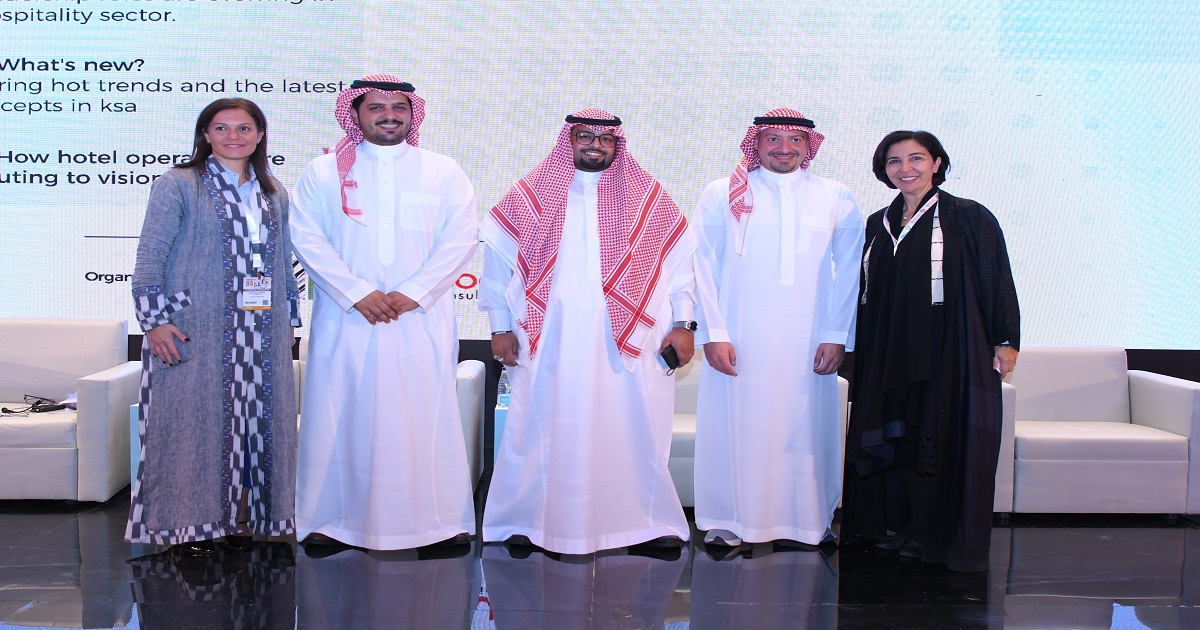Senior Saudi HR professionals were invited to participate in a discussion on human resource opportunities, challenges and how the hospitality industry is responding to Saudization. “Human resources in the spotlight and understanding Saudization” was held on November 24, 2022, during the 11th edition of Saudi HORECA Riyadh, the kingdom’s largest hospitality and foodservice trade event.
Organized by Semark Group, Hospitality News Middle East and Hodema consulting services Middle East and Africa, the three panelists included Yasir Al Radhwi, area director of human resources in KSA at Rotana Hotel Management Corporation; Sultan Alayyash, human resources director at Al Hokair Group; and Tareq Al Sawan, HR advisor and tourism jobs nationalization manager at the Ministry of Tourism. Nada Alameddine, managing partner of Hodema consulting services Middle East and Africa, moderated the session.
Current state of HR
Al Sawan said that the Ministry of Tourism is working on human capital development and is committed to creating one million hospitality jobs by 2030.
Al Radhwi mentioned that Rotana was receiving a high number of applicants who are Saudi. He added that programs and training initiatives led by the MoT are helping to improve the quality of human capital in the hospitality sector.
At Hokair group, training programs are offered to staff, and there continues to be a high number of Saudi applicants, according to Alayyash. However, he highlighted market shortages.
Saudization
In terms of numbers, Rotana has around 900 employees across its hotels in KSA, 400 of which are Saudi nationals (40-45 percent Saudization). Al Radhwi stated that 35-40 percent of the employees are women.
Al Hokair Group owns and manages 35 hotels. In total, there are over 1000 employees. “Around 37-40 percent of the staff is Saudi, and women account for half of the total,” said Alayyash.
Due to Saudization requirements, there is a higher percentage of Saudis employed in areas like Mecca and Medina compared to elsewhere, like Riyadh. There are also specific roles for Saudi nationals.
Changing perceptions
Alayyash said that, in the past, KSA was known primarily as a religious destination, with Mecca and Medina being the main sites of pilgrimage. However, Mohammed bin Salman, Crown Prince and Prime Minister of Saudi Arabia (MBS), has promoted tourism across the whole kingdom so there is demand for staff, especially young people wanting to join the industry.
Al Sawan added that there has been increased awareness of tourism. Since tourist visas have been easier to obtain, the industry has flourished.
The panel mentioned that a larger number of students are taking tourism courses as there are employment opportunities and good career prospects. Al Radhwi said: “There is a future for those working in the industry. While you may not have found Saudis working in certain departments, such as the kitchen or housekeeping, in the past, things have changed considerably.”
Training programs
Al Sawan said that the MoT works with the workforce planning team to identify gaps and support the industry with training programs. The Tourism Pioneers Trailblazers initiative was launched in 2022, with in-kingdom and out-of-kingdom segments. “Our target was to train 100,000 Saudis, but that target was exceeded by 50,000. The candidates were trained at the top international schools, including Les Roches, Glion, as well as schools in KSA.” Al Sawan went on to say that after completing their training, the candidates were connected with three recruitment companies.
At Rotana, Al Radhwi mentioned that passion and willingness to learn and grow are traits they look for in candidates. “The quality of staff is getting better thanks to training. For the first three months, we offer a full and extensive program. We welcome candidates from all backgrounds,” he added.
Gender equality
The panelists agreed that gender equality exists and that there is no pay difference.
Hospitality on the rise
Al Sawan noted that hospitality careers have become trendier and more accepted in recent years, as the younger generation is discovering that it is not simply a springboard or temporary stop switching to more traditional industries, like oil or construction. “The industry is developing, and we have top schools in the kingdom.”
It is clear that young Saudis are being encouraged to pursue hospitality careers, with most programs subsidized by the government.
Al Radhwi said that the quality is improving, with a greater number of young people interested in working in hotels. He added that success stories of Saudis reaching senior positions in hotels are being shared on social media and that the MoT initiative was very successful. “We have three Saudi employees in Mecca, Riyadh and Khobar who are ready to take on GM positions.”
Alayyash also spoke about the benefits young people to become hoteliers.
What’s on the horizon?
Rotana Group has eight hotels in KSA, with two properties ready to launch in the Eastern region. In the next three years, Al Radhwi predicts that Rotana Group will operate 16-20 hotels throughout the kingdom. A larger portfolio will create more employment opportunities. He also mentioned that the employee turnover rate is lower than before despite a labor shortage.
Al Sawan discussed the public-private sector partnerships that are helping to fill vacancies. “What we are doing in terms of human capital development is working on training plans to either upscale the current skills in the market or create and develop programs for job seekers. We don’t want just numbers — we want quality,” he said.
Alayyash said that Al Hokair Group is still experiencing shortages in finding the right caliber of staff. He added that Saudis are ready to travel around the kingdom, and there are plenty of opportunities in secondary cities.
The panel mentioned that due to high levels of competition and a large number of hospitality establishments in the capital, employee turnover rates are most significant in Riyadh.
Alameddine wrapped up the talk by sayin: “The support of the Ministry of Tourism in KSA through human capital development programs in addition to training plans will enhance the caliber of hospitality staff and contribute to a local professional workforce.”
















